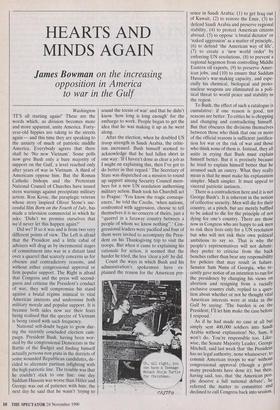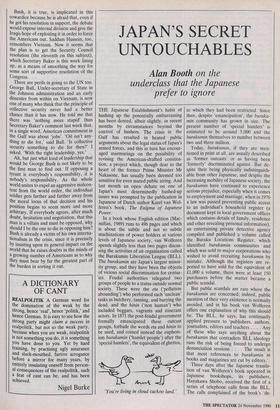HEARTS AND MINDS AGAIN
James Bowman on the increasing opposition in America to war in the Gulf
Washington 'IT'S all starting again!' These are the words which, as division becomes more and more apparent, unite America. Forty- year-old hippies are taking to the streets again — and this time they are speaking to the anxiety of much of patriotic middle America. Everybody agrees that there shall be 'No new Vietnam'. Some polls now give Bush only a bare majority of support on the Gulf, a level reached only after years of war in Vietnam. A third of Americans oppose him. But the Roman Catholic bishops and the Protestant National Council of Churches have issued stern warnings against precipitate military action. Ron Kovic, the paraplegic veteran whose story -inspired Oliver Stone's suc- cessful film Born on the Fourth of July, has made a television commercial in which he asks: 'Didn't we promise ourselves that we'd never let this happen again?'
Did we? If so it was and is from two very different points of view. The Left is afraid that the President and a little cabal of advisers will drag us by incremental stages of commitment into war in a distant land over a quarrel that scarcely concerns us for obscure and contradictory reasons, and without either congressional approval or firm popular support. The Right is afraid that Congress and the press will second- guess and criticise the President's conduct of war; they will compromise his stand against a brutal regime inimical to vital American interests and undermine both military morale and popular support. It is because both sides now see their fears being realised that the spectre of Vietnam is being raised with such frequency.
National self-doubt began to grow dur- ing the recently concluded election cam- paign. President Bush, having been wor- sted by the congressional Democrats in the Battle of the Budget and finding himself actually persona non grata in the districts of some wounded Republican candidates, de- cided to alternate partisan infighting with the high patriotic line. The trouble was that he couldn't stick to one line: one day Saddam Hussein was worse than Hitler and George was out of patience with him; the next day he said that he wasn't 'trying to
sound the tocsin of war' and that he didn't know 'how long is long enough' for the embargo to work. People began to get the idea that he was making it up as he went along.
After the election, when he doubled US troop strength in Saudi Arabia, the critic- ism increased. Bush himself seemed to acknowledge that he had fallen short in one way: 'If I haven't done as clear a job as I might on explaining this, then I've got to do better in that regard.' The Secretary of State was dispatched on a mission to round up support among Security Council mem- bers for a new UN resolution authorising military action. Bush took his Churchill act to Prague: 'You know the tragic consequ- ences,' he told the Czechs, 'when nations, confronted with aggression, choose to tell themselves it is no concern of theirs, just a "quarrel in a faraway country between a people of whom we know nothing": Con- gressional leaders were pacified and four of them were invited to accompany the Presi- dent on his Thanksgiving trip to visit the troops. But when it came to explaining his rationale for action, it seemed that the harder he tried, the less 'clear a job' he did.
Count the ways in which Bush and his administration's spokesmen have ex- plained the reason for the American pre- sence in Saudi Arabia: (1) to get Iraq out of Kuwait, (2) to restore the Emir, (3) to defend Saudi Arabia and preserve regional stability, (4) to protect American citizens abroad, (5) to oppose 'a brutal dictator' or 'naked aggression' as a matter of principle, (6) to defend 'the American way of life', (7) to create a 'new world order' by enforcing UN resolutions, (8) to prevent a regional hegemon from controlling Middle Eastern oil exports, (9) to preserve Amer- ican jobs, and (10) to ensure that Saddam Hussein's war-making capacity, and espe- cially his chemical, biological and proto- nuclear weapons are eliminated as a poli- tical threat to world peace and stability in the region.
To Bush, the effect of such a catalogue is cumulative: if one reason is good, ten reasons are better. To critics he is chopping and changing and contradicting himself. But that obscures the divisions themselves between those who think that one or more of the official reasons is sufficient justifica- tion for war or the risk of war and those who think none of them is. Instead, they all unite in crying that Bush must explain himself better. But it is precisely because he tried to explain himself better that he aroused such an outcry. What they really mean is that he must make his explanation simpler. Much simpler. It must appeal to visceral patriotic instincts.
There is a contradiction here and it is not George Bush's. It is inherent in the notion of collective security. Men will die for their country, at a pinch, but are merely baffled to be asked to die for the principle of not dying for one's country. There are those now in Congress who are happy to ask men to risk their lives only for a UN resolution but who will not risk their own political ambitions to say so. That is why the people's representatives will not debate: they prefer to criticise from the back benches rather than bear any responsibility for policies that may result in failure. Senator Sam Nunn of Georgia, who re- cently gave notice of an intention to run for the presidency by changing his views on abortion and resigning from a racially exclusive country club, replied to a ques- tion about whether or not he thought vital American interests were at stake in the Gulf by saying: 'The burden is on the President; I'll let him make the case before I respond.'
As if he had made no case at all but simply sent 400,000 soldiers into Saudi Arabia without explanation! No, Sam, it won't do. You're responsible too. Like- wise, the Senate Majority Leader, George Mitchell, said last week that 'the President has no legal authority, none whatsoever, to commit American troops to war' without congressional approval (though a great many presidents have done it); but then, having said, too, that 'the American peo- ple deserve a full national debate', he referred the matter to committee and declined to call Congress back into session. Bush, it is true, is implicated in this cowardice because he is afraid that, even if he got his resolution in support, the debate would expose internal division and give the Iraqis hope of exploiting it in order to force the Americans out. Saddam Hussein, too, remembers Vietnam. Now it seems that the plan is to get the Security Council resolution (the eleventh on this subject), which Secretary Baker is this week lining up, as a means of smoothing the way for some sort of supportive resolution of the Congress.
There are perils in going to the UN too. George Ball, Under-secretary of State in the Johnson administration and an early dissenter from within on Vietnam, is now one of many who think that the principle of collective security never had a better chance than it has now. He told me that there was 'nothing more stupid' than Secretary Baker's comment last week that, in a single word, American commitment in the Gulf was about 'jobs'. 'Oil isn't any- thing to die for,' said Ball. 'Is collective security something to die for then?' I asked. 'With the right leadership, yes.' Ah, but just what kind of leadership that would be George Bush is not likely to be the first man to find out. If opposing a tyrant is everybody's responsibility, it is nobody's responsibility. As the whole world unites to expel an aggressive malcon- tent from the world order, the individual soldier gets farther and farther away from the moral locus of that decision and his Position begins to seem more and more arbitrary. If everybody agrees, after much doubt, hesitation and negotiation, that this man is a villain and must be opposed, why Should I be the one to die in opposing him? Bush is already a victim of his own interna- tionalism in the crisis, since it is precisely by insisting upon its general impact on the world that he raises doubts in the minds of a growing number of Americans as to why they must bear by far the greatest part of the burden in sorting it out.



































































 Previous page
Previous page